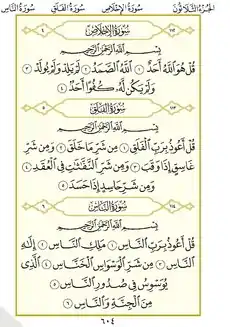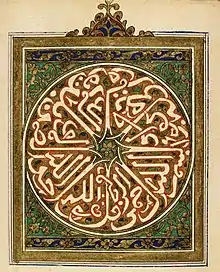Al-Ikhlas
The Declaration of God's Unity [1] aka Sincerity (Arabic: الْإِخْلَاص, al-ikhlāṣ ) [2] aka Monotheism (Arabic: التوحيد, al-tawḥīd),[3] is the 112th chapter (sūrah) of the Quran.
- [4] SAY, God is one GOD;
- the eternal GOD:
- He begetteth not, neither is He begotten:
- and there is not any one like unto Him.[5]
| ٱلإخْلَاص Al-Ikhlāṣ Sincerity | |
|---|---|
| Classification | Meccan |
| Alternate titles (Ar.) | At-Tawḥīd |
| Other names | Absoluteness, The Unity, Oneness of God, Sincere Religion, The Declaration of [God's] Perfection |
| Position | Juzʼ 30 |
| No. of verses | 4 |
| No. of words | 15 |
| No. of letters | 47 |
| Quran |
|---|
 |
|
According to Sale, this chapter is held in particular veneration by Muslims, and declared, by Islamic tradition, to be equal in value to a third part of the whole Quran. It is said to have been revealed during the Quraysh Conflict with Muhammad in answer a challenge over the distinguishing attributes of the GOD , Muhammad invited them to worship.[6]
Al-Ikhlas is not merely the name of this surah but also the title of its contents, for it deals exclusively with Tawhid. The other surahs of the Quran generally have been designated after a word occurring in them, but in this surah the word Ikhlas has occurred nowhere. It has been given this name in view of its meaning and subject matter.
Summary
Quranic recitation and memorisation
Muslims recite and memorize the whole or part of the Quran as acts of virtue. Reciting the Quran with elocution (tajweed) has been described as an excellent act of worship.[8]
Text and meaning

Text and transliteration
بِسْمِ ٱللَّهِ ٱلرَّحْمَٰنِ ٱلرَّحِيمِ
Bismi l-lāhi r-raḥmāni r-raḥīm(i)
قُلْ هُوَ ٱللَّهُ أَحَدٌ
1 Qul huwa l-lāhu ’aḥad(un)
ٱللَّهُ ٱلصَّمَدُ
2 ’allāhu ṣ-ṣamad(u)
لَمْ يَلِدْ وَلَمْ يُولَدْ
3 Lam yalid walam yūlad
وَلَمْ يَكُن لَّهُۥ كُفُوًا أَحَدٌۢ
4 Walam yaku l-lahū kufuwan ’aḥad(un)
- Warsh from Nafi‘ al-Madani
بِسۡمِ اِ۬للَّهِ اِ۬لرَّحۡمَٰنِ اِ۬لرَّحِيمِ
Bismi l-lāhi r-raḥmāni r-raḥīm(i)
قُلۡ هُوَ ا۬للَّهُ اَحَدٌ
1 Qul huwa l-lāhu ’aḥad(un)
اَ۬للَّهُ اَ۬لصَّمَدُ
2 ’allāhu ṣ-ṣamad(u)
لَمۡ يَلِدۡ وَلَمۡ يُولَدۡ
3 Lam yalid walam yūlad
وَلَمۡ يَكُن لَّهُۥ كُفُؤًا اَحَدٌۢ
4 Walam yaku l-lahū kufu’an aḥad(un)
Meanings
1
Say (O Muhammad (Peace be upon him)): "He is Allah, (the) One.
2
"Allah-us-Samad (The Self-Sufficient Master, Whom all creatures need, He neither eats nor drinks).
3
"He begets not, nor was He begotten;
4
"And there is none co-equal or comparable unto Him."
Translation:Noble Quran, 1990
1
Say, "He is Allāh, [who is] One,
2
Allāh, the Eternal Refuge.
3
He neither begets nor is born,
4
Nor is there to Him any equivalent."
Translation:Saheeh International, 1997
1
Say: He is Allah, the One and Only;
2
Allah, the Eternal, Absolute;
3
He begetteth not, nor is He begotten;
4
And there is none like unto Him.
Translation:Yusuf Ali, 1934
1
Say: He is Allah, the One!
2
Allah, the eternally Besought of all!
3
He begetteth not nor was begotten.
4
And there is none comparable unto Him.
Translation:Pickthall, 1930
Exegesis
In the early years of Islam, some surahs of the Quran came to be known by several different names, sometimes varying by region.[9] This surah was among those to receive many different titles. It is a short declaration of tawhid, Allah's absolute oneness, consisting of four ayat. Al-Ikhlas means "the purity" or "the refining".
It is disputed whether this is a Meccan or Medinan sura. The former seems more probable, particularly since it seems to have been alluded to by Bilal of Abyssinia, who, when he was being tortured by his cruel master, is said to have repeated "Ahad, Ahad!" (unique, referring as here to God). It is reported from Ubayy ibn Ka'b that it was revealed after the polytheists asked "O Muhammad! Tell us the lineage of your Lord."
Q112:1-2 none comparable to God
Surah Al-Ikhlas contains four verses: 112:1. Say: He is Allah, One. 112:2. Allah As-Samad. 112:3. He begets not, nor was He begotten. 112:4. And there is none comparable to Him.[2]
About this, Tafsir Ibn Kathir says:
"When the Jews said, `We worship Uzayr, the son of Allah,' and the Christians said, `We worship the Messiah (Isa), the son of Allah,' and the Zoroastrians said, `We worship the sun and the moon,' and the idolators said, `We worship idols,' Allah revealed to His Messenger, Say: "He is Allah, One. He is the One, the Singular, Who has no peer, no assistant, no rival, no equal and none comparable to Him.[2]
This word (Al-Ahad) cannot be used for anyone in affirmation except Allah the Mighty and Majestic, because He is perfect in all of His attributes and actions.
Hadith

According to hadiths, this surah is an especially important and honored part of the Quran:
- Narrated Abu Said Al-Khudri: A man heard another man reciting (in the prayers): 'Say (O Muhammad): "He is Allah, the One." (112.1) And he recited it repeatedly. When it was morning, he went to the Prophet and informed him about that as if he considered that the recitation of that Sura by itself was not enough. Allah's Apostle said, "By Him in Whose Hand my life is, it is equal to one-third of the Quran."[10][11]
- Narrated Yahya related to me from Malik from Ibn Shihab that Humayd ibn Abd ar-Rahman ibn Awf had told him that Surat al-Ikhlas (Surah 112) was equal to a third of the Qur'an, and that Surat al-Mulk (Surah 67) pleaded for its owner.[12]
- Narrated 'Aisha: The Prophet sent (an army unit) under the command of a man who used to lead his companions in the prayers and would finish his recitation with (the Sura 112): 'Say (O Muhammad): "He is Allah, the One." ' (112.1) When they returned (from the battle), they mentioned that to the Prophet. He said (to them), "Ask him why he does so." They asked him and he said, "I do so because it mentions the qualities of the Beneficent and I love to recite it (in my prayer)." The Prophet; said (to them), "Tell him that Allah loves him"[13]
- Imam Malik ibn Anas recorded from Ubayd bin Hunayn that he heard Abu Hurayrah saying, "I went out with the Prophet and he heard a man reciting `Say: He is Allah, the One.' So the Messenger of Allah said, (It is obligatory). I asked, `What is obligatory' He replied, "Paradise."[2]
- Narrated by Abu Said, the Prophet said to his companions, "Is it difficult for any of you to recite one third of the Qur'an in one night?" This suggestion was difficult for them so they said, "Who among us has the power to do so, O Allah's Apostle?" Allah Apostle replied: " Allah (the) One, the Self-Sufficient Master Whom all creatures need.' (Surat Al-Ikhlas 112.1 ..to the End) is equal to one third of the Qur'an."[14][15]
- Al-Bukhari reported from Amrah bint Abdur-Rahman, who used to stay in the apartment of Aisha, the wife of the Prophet, that Aisha said, "The Prophet sent a man as the commander of a war expedition and he used to lead his companions in prayer with recitation (of the Quran). And he would complete his recitation with the recitation of `Say: He is Allah, One.' So when they returned they mentioned that to the Prophet and he said, Ask him why does he do that? So they asked him and he said, "Because it is the description of Ar-Rahman and I love to recite it. So the Prophet said, "Inform him that Allah the Most High loves him."[2] This is how Al-Bukhari recorded this hadith in his book of tawhid. Muslim and an-Nisai also recorded it.
- An authentic Hadith says 'Say [recite] Surat al-Ikhlās and al-Muawwidhatayn (Surat al-Falaq and Surat an-Nās) three times in the morning and the evening; they will suffice you from everything.' [Narrated by At-Tirmidhi. And Muhammad Nasiruddin al-Albani authenticated it: 2829[16]
- Narrated Aisha: "Whenever the Prophet went to bed every night, he used to cup his hands together and blow over it after reciting Surah al-Ikhlas, Surah al-Falaq and Surah an-Nas, and then rub his hands over whatever parts of his body he was able to rub, starting with his head, face and front of his body. He used to do that three times.[17][18]
- Imam Ahmad also recorded that Ibn 'Umar said, "I watched the Prophet twenty-four or twenty-five times reciting in the two Rak'ahs before the Morning prayer and the two Rak'ahs after the Sunset prayer, 'Say: "O ye infidels!"' (Surah Al-Kafirun) and "Say: "He is Allah, One."[2]
See also
References
- George Sale translation
- Ibn Kathir. "Tafsir Ibn Kathir (English): Surah Al Akhlas". Quran 4 U. Tafsir. Retrieved 26 December 2019.
- The 1698 Maracci Quran notes some chapters have two or more titles, occasioned by the existence of different copies in the Arabic.(George Sale Preliminary discourse 3)
- Arabic script in Unicode symbol for a Quran verse, U+06DD, page 3, Proposal for additional Unicode characters
- Sale, G AlKoran
- George Sale's footnotes to Quran 113, AlKoran
- Wherry, Elwood Morris (1896). A Complete Index to Sale's Text, Preliminary Discourse, and Notes. London: Kegan Paul, Trench, Trubner, and Co.
 This article incorporates text from this source, which is in the public domain.
This article incorporates text from this source, which is in the public domain. - Nigosian, S.A. (2004). Islam: Its History, Teaching, and Practices. Indiana University Press. p. 70. ISBN 978-0-253-21627-4.
- A.T. Welch, art. ‘al-Ḳur’ān’ in Encyclopaedia of Islam, 2nd edn. On early development of sura headings see Adam Gacek, Arabic Manuscripts: A Vademecum For Readers, Handbook of Oriental Studies (Leiden/Boston: Brill, 2009), pp. 219–20.
- Translation of Sahih Bukhari, Book 93: Oneness, Uniqueness of Allah (Tawheed) Volume 9, Number 471
- http://www.islamicity.com/mosque/sunnah/bukhari/093.sbt.html
- Imam Malik's Muwatta Chapter No: 15, The Quran Hadith no: 19
- Translation of Sahih Bukhari, Book 93: Oneness, Uniqueness of Allah (Tawheed) Volume 9, Number 472
- https://www.sahih-bukhari.com/Pages/Bukhari_6_61.php
- Translation of Sahih Bukhari, Book 61: Virtues of the Qur'an Book 61, Number 534
- "Archived copy" (PDF). Archived from the original (PDF) on 2011-10-13. Retrieved 2011-08-18.CS1 maint: archived copy as title (link)
- (Sahih al-Bukhari Vol.6 Bk.6 No.536)
- Translation of Sahih Bukhari, Book 71: Medicine Volume 7, Number 644
External links
- Quran 112 Clear Quran translation
- Works by Abdullah Yusuf Ali at Project Gutenberg
- The Holy Qur'an, translated by Abdullah Yusuf Ali
- Three translations at Project Gutenberg
- Works by Marmaduke Pickthall at Project Gutenberg